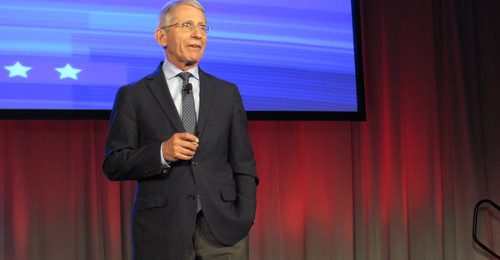BY MICHAEL K. LAVERS, WASHINGTON BLADE

Dr. Anthony Fauci, director of the National Institutes of Health's National Institute of Allergy and Infectious Diseases, speaks at the U.S. Conference on AIDS at the Marriott Marquis Hotel in D.C. on Sept. 9, 2017. (Washington Blade photos by Michael K. Lavers)
The director of the National Institute of Allergy and Infections Diseases at the National Institutes of Health on Saturday said more resources need to be devoted to ending the global HIV/AIDS epidemic.
Dr. Anthony Fauci in a presentation he gave at the U.S. Conference on AIDS at the Marriott Marquis Hotel in D.C. noted "individual countries" have met UNAIDS targets of having 90 percent of people with HIV knowing their status, receiving antiretroviral therapy and having undetectable viral loads by 2020. He pointed out "globally as a whole we are still far from the mark at 44 percent."
"We need to do much better," said Fauci. "You do much better with resources."
Fauci said 19.5 million of the more than 36 million people around the world who are living with HIV are on antiretroviral drugs. He noted there is a "treatment gap" of 17.2 million people.
"We are really far off the mark. so we need to so something at a global epidemiological level that involves not only people in this room, but governments, our own, international organizations that need to pull together for that," said Fauci.
House Minority Leader Nancy Pelosi (D-Calif.) in her remarks at the conference's opening plenary on Thursday noted President Trump's proposed budget for the 2018 fiscal year would cut $850 million from the President's Emergency Plan for AIDS Relief (PEPFAR) and $225 million from the Global Fund for AIDS, Tuberculosis and Malaria. She also criticized the White House for proposing cuts to the Ryan White Comprehensive AIDS Resource Emergency Act that provides assistance to low-income people with HIV and their families, the Housing Opportunities for People with AIDS (HOPWA), the U.S. Department of Health and Human Services' Office of Minority Health and the National Institutes of Health itself.
Fauci in his remarks did not specifically refer to the proposed cuts. He did say, however, there is a need for an HIV vaccine "to achieve what I call durable end of the HIV pandemic."
"We're not talking about the individual person who's living with HIV or what we can do for at the at-risk purpose, even in the absence of a vaccine," he said. "But globally and epidemiology if we want to end the epidemic, if it's durable we're going to need a vaccine."
'We Are a Movement for Social Justice'
Roughly 3,000 people attended the conference that NMAC — formerly known as the National Minority AIDS Council — organized.
NMAC Executive Director Paul Kawata on Saturday discussed Trump's proposed budget, noting it "has been a very difficult time in Washington."
"We are a movement for social justice," he said. "We are a movement for social justice that is dependent upon government funding."
Kawata in his remarks referenced last month's white supremacist rally in Charlottesville, Va., last month that left a 32-year-old woman dead and more than a dozen others injured. He also noted the Trump administration's decision to rescind the Deferred Action for Childhood Arrivals (DACA) program that has allowed roughly 800,000 young documented immigrants to remain in the U.S. and obtain work permits.
"A lot of us are really hurting right now," said Kawata. "There's so many messages that we're getting."
"We're being told in the outside world that we're second-class citizens," he added. "Goddamn it we are not second-class citizens and we deserve to fight and we deserve to stand up for who we are."

NMAC Executive Director Paul Kawata speaks at the U.S. Conference on AIDS at the Marriott Marquis Hotel in D.C. on Sept. 9, 2017. (Washington Blade photo by Michael K. Lavers)
Members of the U = U campaign — which describes itself as "a health equity initiative to end the dual epidemics of HIV and HIV-related stigma by empowering people with and vulnerable to HIV with accurate and meaningful information about their social, sexual, and reproductive health" — took to the stage before Kawata spoke and protested.
"I'm so happy today as a gay black man to be able to say that U = U," said Roscoe Boyd of Detroit. "I've been taking my medication every day and because of that I cannot transmit the virus to my partner. That empowers me to live a life that's full and free."
AIDS Alabama CEO Kathie Hiers echoed Boyd when she spoke.
"If you are undetectable. you are not a danger," said Hiers. "You can have a healthy sex life. you can have babies. the sky is the limit."
Fauci on Saturday noted his support for the campaign.
"The science does really verify and validate that U = U," he said.
Conference organizers on Friday allowed a group of five transgender rights advocates who interrupted a plenary to speak on the stage for nearly 20 minutes. One man who attended Saturday's plenary interrupted Kawata and criticized conference organizers for not providing "space for the Latino community."
"You call this a family reunion, but I have not seen one Latino voice on that main stage," said the man, who did not identify himself. "It's very heartbreaking to come here once again and not see a Latino presence on the main stage."
"Our people are hurting too," he added. "We're brown and undocumented. we're brown and gay. we're brown, gay and undocumented . . . our voice is important."
Kawata acknowledged the man from the stage after he stopped speaking.
"Thank you for standing up and speaking your truth," said Kawata. "Thank you for speaking up and for holding me accountable."










